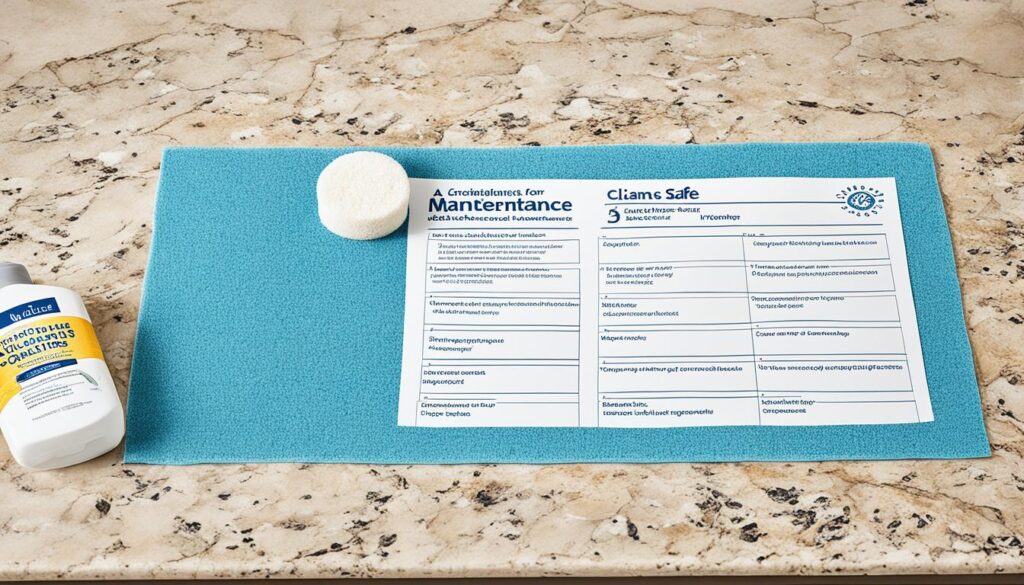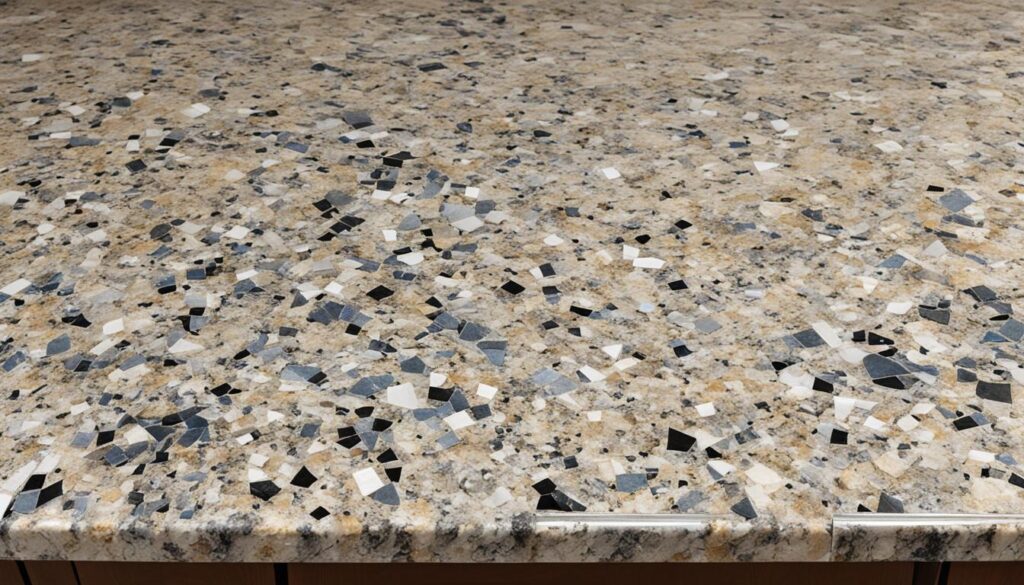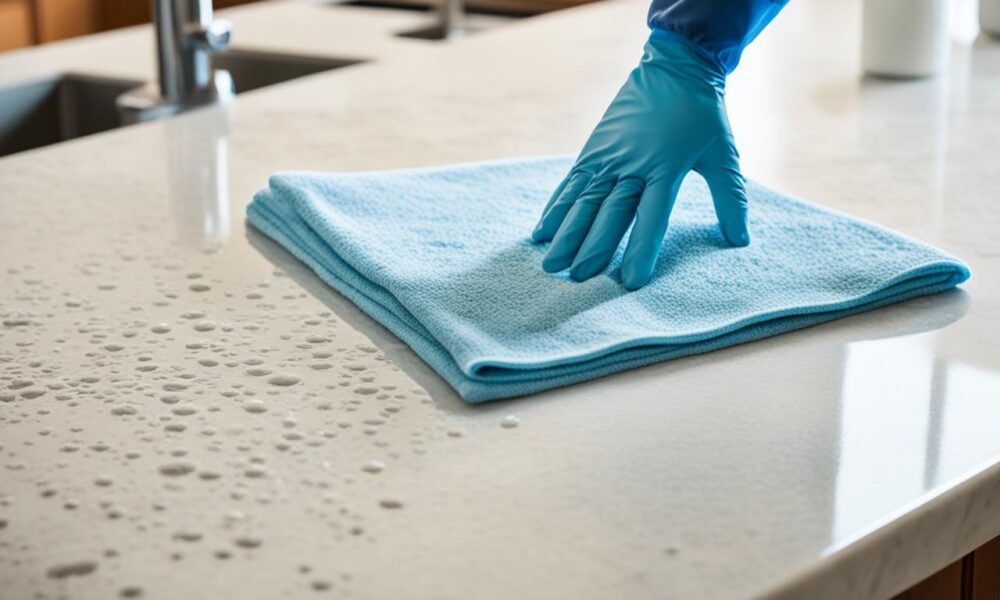Natural Stone Countertop Care and Maintenance Guide
Natural stone countertops are both beautiful and durable for any home. They need some care to stay looking great. This guide will teach you how to clean, protect, and preserve your countertops. We’ll cover the basics of caring for natural stone countertops, including how to prevent damage, clean them, and seal them.
Natural stone countertops are tough but can stain, etch, or get damaged if not cared for. Most need sealing every year to stop them from becoming porous and staining. Some stones, like marble, might need sealing more often. Quartz countertops are easier to maintain, needing only regular cleaning and care.
This guide will show you how to keep your natural stone countertops looking great for years. We’ll cover daily cleaning, sealing, and professional maintenance. Follow these tips to keep your countertops beautiful and functional.
Key Takeaways
- Most natural stone countertops require annual sealing to prevent staining and damage
- Quartz countertops are a low-maintenance option that only needs regular cleaning
- Marble countertops are particularly porous and may require more frequent sealing
- Avoid using acidic or harsh cleaners on natural stone surfaces
- Use coasters, trivets, and mats to protect countertops from heat and spills
Understanding the Basics of Natural Stone Countertop Care
Looking after your natural stone countertops is key to keeping them looking great and lasting long. By following some simple tips, using the right cleaning methods, and sealing them regularly, your countertops will stay in top shape for many years.
Prevention Tips for Protecting Your Natural Stone Countertops
Protecting your countertops is a smart move. Here are some easy tips to remember:
- Use coasters under glasses and mugs to prevent water rings and stains
- Place trivets or hot pads under hot dishes to avoid thermal shock and scorching
- Always use cutting boards when preparing food to prevent scratches and etching
- Blot spills immediately with a clean, soft cloth to prevent staining
Essential Cleaning Techniques for Natural Stone Surfaces
Cleaning your countertops regularly is key to keeping them looking good and clean. Here’s how to do it right:
- Use a stone soap, neutral cleanser, or mild dishwashing liquid made for natural stone
- Avoid harsh or acidic cleaners that can harm the stone
- Apply the cleaner with a soft cloth or sponge, and rinse well with clean water
- Dry the surface with a soft, lint-free cloth to prevent water spots and streaks
Weiman’s Granite & Stone Daily Clean & Shine with Disinfectant kills 99.9% of germs and bacteria, including E. Coli, Salmonella, Staph, Influenza A, and Human Coronavirus.
The Importance of Sealing Natural Stone Countertops
Sealing your countertops is crucial to protect them from stains, etching, and water damage. Most natural stones are porous, so they can soak up liquids and stain if not sealed. Here’s what you should know about sealing your countertops:
| Stone Type | Sealing Frequency | Additional Tips |
|---|---|---|
| Granite | Every 6-12 months | Test the seal by sprinkling water on the surface; if it beads up, the seal is intact |
| Marble | Every 3-6 months | Use a penetrating sealer specifically designed for marble |
| Limestone | Every 6-12 months | Apply sealer in a well-ventilated area and follow manufacturer’s instructions |
| Travertine | Every 6-12 months | Seal high-use areas and sink lips more frequently |
By following these tips, cleaning methods, and sealing advice, you can keep your natural stone countertops looking great and stain-resistant for years.
Caring for Quartz Countertops: A Low-Maintenance Option
Quartz countertops are popular among homeowners for their beauty and ease of care. They are made from natural quartz mixed with resin and pigments. This mix creates a strong and easy-to-maintain surface. With a few simple steps, your quartz countertops will stay beautiful and useful for many years.
Routine Cleaning and Maintenance for Quartz Countertops
Quartz countertops are easy to clean, unlike other stones. They don’t need sealing or polishing to look great. Here’s how to keep them looking new:
- Wipe the surface daily with a soft cloth or sponge and warm water.
- For a deeper clean, use mild soap or a quartz cleaner like Simple Green or Mr. Clean.
- Avoid harsh cleaners, scouring pads, or chemicals like bleach, as they can damage the surface.
- Always use a cutting board to prevent scratches and protect your knives.
- Use trivets or hot pads to protect your countertops from extreme heat.
Dealing with Tough Spills and Stains on Quartz Surfaces
Quartz countertops resist stains well because they are non-porous. But some substances can stain if not cleaned right away. Things like tea, coffee, wine, fruit juices, and food coloring can cause discoloration. Here’s how to handle tough spills and stains:
- Blot spills right away with a soft cloth to stop them from spreading.
- For hard stains, make a paste with water and baking soda. Apply it, wait a bit, then scrub with a soft cloth.
- For stuck-on things like gum or paint, use a plastic putty knife to carefully remove it.
- To clean and disinfect, use a 70% isopropyl alcohol cleaner or Lysol spray. These won’t harm your countertops.
| Cleaning Product | Safe for Quartz? | Notes |
|---|---|---|
| Mild dish soap | Yes | Ideal for daily cleaning |
| Simple Green or Mr. Clean | Yes | Recommended for deeper cleaning |
| Isopropyl alcohol (70%) | Yes | Safe for disinfecting |
| Lysol disinfectant spray | Yes | Effective for sanitizing |
| Abrasive cleaners or scouring pads | No | Can dull or damage the surface |
| Bleach or harsh chemicals | No | May etch or discolor the surface |
By following these easy care tips, your quartz countertops will stay beautiful and easy to maintain. They are a great choice for any busy home.
Granite Countertop Care: Preserving the Beauty and Durability
Granite countertops have been a top choice for kitchens for 15-20 years. They are known for being strong and resistant to stains. This is thanks to the mineral quartz, which is the last to form in granite. In fact, granite was used in ancient Egyptian pyramids because of its strength. To keep your granite countertops looking great, regular cleaning and sealing are key.
Regular Cleaning and Sealing of Granite Countertops
For daily care, use a soft cloth or sponge with warm water and mild soap. Make sure to dry the surface well to prevent water spots. If you spill something, clean it up quickly to avoid stains.
For the best results, clean your countertops with a stone cleaner and a microfiber cloth. Then, buff the surface with a dry microfiber cloth to make it shine.
Granite countertops also need resealing every one to two years. This depends on the stone’s porosity and your kitchen’s activity level. Sealing protects against moisture and stains, keeping the granite looking beautiful. To check if your countertops need resealing, sprinkle water on them. If the water beads up, the seal is still good.
Choosing the Right Sealer for Your Granite Countertops
Choosing the right sealer is important for your granite countertops. Consider these factors when picking a sealer:
- Stain-resistance: Pick a sealer that protects against stains, especially in busy areas like kitchens.
- Durability: Choose a heavy-duty sealer that can handle daily use and various substances.
- Ease of application: Look for a sealer that is easy to apply and has clear instructions.
- Compatibility: Make sure the sealer is safe for granite surfaces to avoid damage.
By picking the right sealer and applying it right after installation, and reapplying every one to two years, you can keep your granite countertops looking great for years.
Prevent granite damage by using cutting boards, coasters, and hot pads.
| Granite Care Task | Frequency |
|---|---|
| Daily cleaning with stone cleaner and microfiber cloth | Daily |
| Buffing with a dry microfiber cloth | Daily |
| Resealing | Every 1-2 years |
| Testing for resealing | Annually |
By following these cleaning and sealing tips, and taking preventive steps, you can keep your granite countertops beautiful, durable, and stain-resistant for years.
Marble Countertop Maintenance: Keeping Your Surfaces Pristine
Marble countertops add a timeless elegance to any home. They require special care because they are porous. By learning how to clean and seal them, you can keep your marble countertops looking great for years.
Addressing the Porous Nature of Marble Countertops
Understanding marble’s porous nature is key to keeping it clean. Marble can stain, etch, and scratch easily, especially in busy areas like kitchens and bathrooms. Here are some tips to help:
- Clean up spills right away to stop stains
- Use coasters and trivets to protect against heat and water rings
- Avoid cutting on the marble to prevent scratches and etching
- Don’t use acidic cleaners like bleach or vinegar, as they can dull the surface
Selecting Appropriate Cleaners and Sealers for Marble Surfaces
Choosing the right cleaners and sealers is vital for your marble countertops. For daily cleaning, gentle soap and warm water work well. For tough stains, try these methods:
| Stain Type | Treatment |
|---|---|
| Oil-based | Baking soda paste (left overnight) |
| Organic (coffee, tea) | Hydrogen peroxide mixed with ammonia |
| Ink | Depends on marble color (consult professional) |
Sealing your marble countertops is also crucial for their upkeep. A good, heavy-duty sealer protects against stains and etching. Seal your countertops every 6-12 months, more often in busy areas.
Regular sealing and quick repairs keep marble countertops looking great.
While you can maintain your marble yourself, experts offer deep cleaning and stain removal. They can also give advice and polishing to keep your countertops looking new.
Solid Surface Countertop Care: A Unique Maintenance Approach
Solid surface countertops are made from tough plastic resin. They are a good choice instead of natural stone. They don’t stain easily and don’t need sealing like some stones do. But, they are not as long-lasting as natural stone, so they need special care and cleaning.
To keep your solid surface countertops looking great, avoid harsh chemicals when cleaning. Things like acetone can make your countertops look dull. Use gentle cleaners like Soft Scrub for tough stains. Clean with a soft sponge to avoid scratches.
According to recent statistics, solid surface countertops, such as Corian, are non-porous and resistant to stains but are prone to scratching.
Keeping your solid surface countertops clean is key to their beauty. They are less porous than natural stone but still get dirty. Here are some tips to keep them looking good:
- Wipe up spills right away to stop stains
- Use a soft, damp cloth for everyday cleaning
- Avoid putting hot pots and pans directly on the surface
- Use trivets or hot pads to protect the countertop from heat damage
- Don’t cut directly on the surface to avoid scratches
If your solid surface countertops get scratched or damaged, you might need professional help. Minor scratches can be fixed with fine-grit sandpaper. But deep scratches or chips might need a pro to fix.
| Countertop Material | Durability | Maintenance |
|---|---|---|
| Solid Surface (e.g., Corian) | Less durable than natural stone | Non-porous, stain-resistant, prone to scratching |
| Granite | Highly durable | Requires annual sealing to prevent stains and etching |
| Quartz | Highly durable | Non-porous, stain-resistant, avoid harsh cleaners |
| Marble | Softer and more porous than granite | Requires regular sealing to prevent stains and etching |
By knowing how to care for your solid surface countertops, they can stay beautiful and useful for a long time. These countertops need less care than some natural stones but still need regular cleaning and attention to stay looking great.
Long-Term Care and Maintenance for Natural Stone Countertops
Keeping your natural stone countertops looking great takes time and effort. By cleaning and sealing them regularly, you protect your investment. This keeps your countertops beautiful for many years.

Developing a Regular Cleaning and Sealing Schedule
It’s key to clean and seal your natural stone countertops often. Use mild soap and water to stop dirt and bacteria from building up. Clean spills right away, especially acidic ones like wine or citrus.
Sealing your countertops helps protect them from stains and water. Some sealers come with warranties from 4 to 15 years. Sealers like DryTreat and MORE Surface Care work well to keep your countertops safe.
| Sealer Brand | Warranty | Protection |
|---|---|---|
| DryTreat | 15 years | Stains, oil, water |
| MORE Surface Care | 10 years | Stains, oil, water |
| allen + roth | Lifetime | Stains, oil, water |
Addressing Common Issues and Repairs for Natural Stone Countertops
Natural stone countertops can face problems like etching, staining, and scratching. These issues can happen when you use acidic foods, harsh cleaners, or sharp objects. To prevent these problems:
- Use cutting boards to avoid scratches
- Clean up spills promptly
- Avoid strong chemicals and cleaners with bleach or ammonia
Textured stone surfaces like travertine need special cleaning. Sometimes, use a heavy-duty cleaner to remove grease and grime.
Regular maintenance and prompt attention to issues will ensure your natural stone countertops remain beautiful and functional for many years to come.
Enhancing the Longevity of Your Natural Stone Countertops
Natural stone countertops, like granite and marble, add beauty and durability to any home. With the right care, they can last for decades. They give your kitchen or bathroom a timeless and elegant look. By following simple guidelines, you can keep your countertops looking great for years.
Proper Use and Protection of Natural Stone Surfaces
To keep your natural stone countertops safe, use them wisely. Always put hot pots and pans on a trivet or hot pad to prevent damage. Use coasters under glasses and mugs to avoid stains, and mats or cutting boards under dishes to prevent scratches.
Granite is very hard and resists scratches and chips well. But, be careful with sharp objects. Marble is softer and can scratch and etch easily. So, always use cutting boards and placemats to protect it.
Avoiding Harmful Substances and Practices
It’s important to avoid harmful substances and practices to keep your countertops looking good. Don’t use cleaners like vinegar or lemon juice because they can dull the surface. Also, avoid using abrasive materials like scouring pads or steel wool, as they can scratch the stone.
Stay away from bleach and other harsh chemicals, as they can damage the countertops. Never use hydrofluoric acid, a very corrosive substance, on natural stone countertops. It can harm the stone’s minerals irreparably.
| Stone Type | Sealing Frequency | Maintenance Tips |
|---|---|---|
| Granite | Once a year | Highly resistant to scratches and chips, but still use caution with sharp objects |
| Marble | More frequent due to higher porosity | Use cutting boards and placemats to protect from scratches and etching |
By following these tips and cleaning and sealing regularly, your natural stone countertops will stay beautiful and useful for years. With the right care, your investment in quality natural stone will boost your home’s value. It will also give you a clean and beautiful surface for your daily needs.
Professional Maintenance and Restoration Services for Natural Stone
Keeping your natural stone countertops looking great and lasting long is key. Regular cleaning and sealing help a lot. But sometimes, you need a pro for deep scratches or nicks. Trying to fix these yourself might make things worse.
Experts in stone restoration have the skills and tools to fix your stone surfaces. They use diamond grinding to polish marble and other stones. They can also remove stains and seal your countertops to protect them.
The cost of professional services depends on the job size, stone type, and finish you want. Big jobs need more time and people, raising the price. Where your countertops are in your home and if they have power and water can also affect the cost.
StoneAge Restoration Services, Inc., has over 20 years of experience in San Clemente and Talega. They offer cleaning, repair, and restoration for many stones. With a skilled team and over 15,000 happy customers since 2007, they’re ready to help with your stone needs.
Professional services might seem expensive, but they’re often a better deal than replacing your countertops. Regular care and quick fixes can make your stone last longer and look better.
| Service | Frequency | Benefits |
|---|---|---|
| Professional cleaning | Every 1-2 years | Removes dirt, grime, and stains |
| Sealing | Every 2-3 years (interior) Every 1-2 years (exterior) |
Prevents stains, water damage, hard water spots, and mineral buildup |
| Restoration | As needed | Repairs deep scratches, nicks, and other damage |
In conclusion, getting professional help is crucial for your natural stone countertops. Quick action and regular care keep them looking great for years.
DIY Natural Stone Countertop Care vs. Professional Services
Choosing between DIY care and professional services for your natural stone countertops is a big decision. Some tasks, like cleaning and sealing, you can do yourself. But, sometimes, you need experts for the best results.

When to Tackle Maintenance Tasks Yourself
If you like to do things yourself, caring for your natural stone countertops can be rewarding. You can handle simple tasks like cleaning with the right cleaners. Also, applying sealers, cleaning up spills quickly, and using coasters can keep your countertops looking great.
By being consistent with these steps, you can keep your stone countertops beautiful for a long time.
Recognizing When Professional Assistance is Necessary
Even with regular care, some jobs need a pro’s touch. Here are times to call in experts:
- Deep cleaning and stain removal: Tough stains might need special cleaners and methods.
- Repair of chips, cracks, or scratches: Pros have the right tools and skills to fix your countertops.
- Restoration of dull or etched surfaces: If your stone looks dull or has etches, pros can make it shine again.
- Sealing porous stones: Stones like marble and limestone need sealing to stay stain-resistant. Experts apply the right sealer for best protection.
| Comparison | DIY Natural Stone Restoration | Professional Natural Stone Restoration Services |
|---|---|---|
| Cost | Generally cost-effective | Higher cost than DIY solutions |
| Results | No guarantee of long-term results | Provide the best possible results due to professional-grade tools and techniques |
| Investment | Requires time and effort to learn proper techniques | Usually worth the investment for optimal results and peace of mind |
When looking for professional help, ask important questions. Check their experience, guarantees, project time, materials, and if they are licensed and insured.
Pure Light in San Diego is an excellent example of a company that offers quality natural stone restoration services while balancing cost and quality for customer satisfaction.
Choosing between DIY and professional help for your countertops depends on your skills, the task’s complexity, and what you want to achieve. Knowing when to do things yourself and when to get expert help will keep your countertops looking great for years.
Eco-Friendly and Sustainable Natural Stone Countertop Maintenance
Keeping your natural stone countertops looking great is easy with eco-friendly methods. Use non-toxic cleaners and sealers to protect your stone and the planet. Choose products that are water-based and free from harsh chemicals. These options are good for your countertops and the air you breathe.
Adding green habits to your cleaning routine helps too. Use coasters to avoid stains and don’t put hot pans on the counter. Dust and mop with a soft cloth often. Look for cleaning products with GREENGUARD, Green Seal, or EPA Safer Choice labels. These marks mean the products are safe and good for the earth.
The kind of stone you have affects how you should care for it. Different stones need different cleaners based on their porosity and finish. By picking the right products and methods, you keep your countertops looking great and help the planet.



